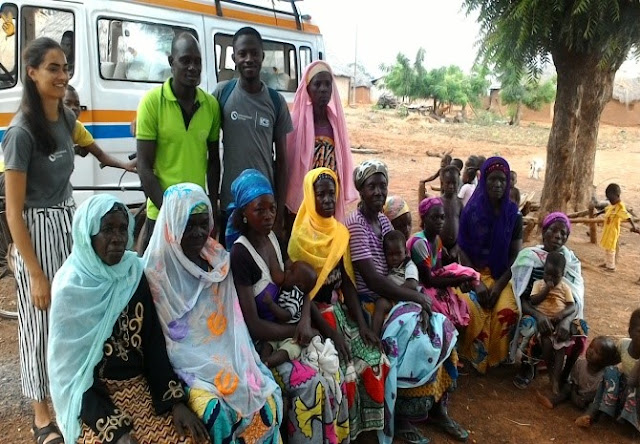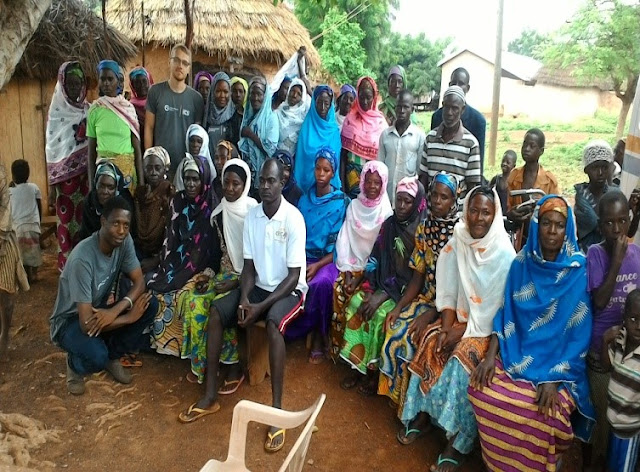Dasiba! On 20th July 2016, we visited our communities for the first time as part of our engagement plan. These seven Income Generating Groups (IGGs) we visited included; Dundo, Dimabi Yepala, Yoggu, Wayamba, Kangbagu and Tolon IGGs (GIGDEV and “No One is All Bad”). They have multiple strengths, weaknesses, opportunities and threats to their businesses. They do however share one common goal – to become a co-operative. Over the next 10 weeks, our community pairs will be hoping to achieve this and helping these IGG’s in the best way we can after establishing the needs assessment to achieve their goal.
 |
| NFED TOLON COHORT 4 TEAM |
Over the course of the 21st of July, International Service volunteers and our team leaders Francis Bacon and Katie Connan including NFED staff, as well as community facilitators, gained our very first impressions and were able to identify some successes, challenges and possible recommendations that could make the activity more successful with future cohorts.
First, regarding our positive impressions, the conclusions we took from this were mainly positive. For example, the first community we visited was Dundo. They were very happy and eager to meet all volunteers and we found this with many of our IGG’s. Yoggu were also very positive and seemed to be very well organised, as well as Kangbagu who were punctual/time conscious and were ready to start work with us. Wayamba and Dimabi Yepala came across as very friendly with Wayamba being ready to collaborate with the team of volunteers. Finally, we all received a good reception from “No One is All Bad” from the Tolon District and they were well organised.
 |
| IGG WITH COMMUNITY PAIR IN DIMABI YEPALA |
 |
| IGG WITH COMMUNITY PAIR IN DUNDO |
 |
| IGG WITH COMMUNITY PAIR IN TOLON (GIDEV & ‘NO ONE IS ALL BAD’) |
 |
| IGG WITH COMMUNITY PAIR IN WAYAMBA |
 |
| IGG WITH COMMUNITY PAIR IN YOGGU |
 |
| IGG WITH COMMUNITY PAIR IN KANGBAGU |
Unfortunately, at the end of the day, some of the impressions created weren’t as optimistic which we hope to improve. In particular, GIGDEV, one of Tolons IGG’s wasn’t as encouraging as others. The reception we received was not that positive and didn’t seem very enthusiastic, and were very reluctant in terms of working with us. In the long term, that could be quite concerning as it may be difficult helping them become a co-operative if there isn’t a collaborative spirit on both sides. Our group noted that Dimabi Yepala were slightly disorganised, with the Chief having to delay volunteers. The turnout as well was only 10 which was the lowest of all communities. These challenges could make things quite difficult for volunteers going forward.
For the upcoming weeks, there are also likely to be various challenges facing our communities where we hope to overcome as many as we can. During the community entry process, the spirit of many in the group was dampened as a result of some of the issues. For example, in terms of some IGG’s, there were a few low turnouts and late turnouts. This led to some bad impressions being created. One important thing noted was when we visited Kangbagu where the chief was discussing road operating which is not part of ICS project aims. This might suggest that the community is unaware of some of International Service and IGG’s operations. Improvements could be made in the actual communities/groups we are visiting in the next three months. Our group discussed the poor organisation of some IGGs and long presentations with IGGs as quite time consuming and we were sometimes behind schedule. Our team leader Francis Vuuri spoke to the community facilitators on Friday 15th July informing them about our upcoming visit on Wednesday 20th July, 2016, however, there was poor attendance of supervisors and absence of IGGs leaders in some communities. One final challenge in the community that could affect ICS was women with children could disrupt meetings as there was a very high women turnout. As a group we should aim to improve on the lateness of arrival and late departure as we visited the first community approximately 9:30am and finished visiting our communities at approximately 16:30pm as against 14:30pm scheduled. Also, the low turnout could be attributed to seasonal factors since this is the rainy season and most women are engaged in farming activities.
Despite the challenges we faced, there were many successes that we can focus on and help encourage and motivate us. For instance, we were able to reach all seven IGG’s and majority were positive and welcoming with mainly women being present during our visits. There was a high turnout for most communities with diverse participation such as people with disability, community elders among others which suggests strong levels of support and belief for International Service and NFED in the district. It’s also encouraging that communities such as Dundo and Yoggu were ready waiting for us which shows good time management skills as well as Kangbagu where we received the highest turnout. For the long term, we need to ensure that supervisors and project partners are supportive and committed to the IGG’s and ICS which definitely looked to be the case. Overall for our groups, it was a well-planned activity, where all communities were met and introduced to the volunteers.
In conclusion, the community entry was successful, meeting all seven communities and receiving a positive response by the majority who are keen to work with us for the upcoming weeks. However, these are some recommendations to help us in the future and to establish any improvements that need to be made. Chairpersons/leaders of IGG’s should be introduced to volunteers for an effective working manner. This may have been done if all communities were informed by the facilitators and supervisors before the day we visited and it could also be argued that the communities in general need to be more educated about the work of International Service. Furthermore, less challenging recommendations include the fact that volunteers should have a break for lunch rather than finally doing this when we have nearly finished visiting our communities. An important suggestion that one of our volunteers made involved self-promotion. Even though there is a high illiterate rate, there could be sign posters of IGG’s especially in their communities to raise awareness and possibly reach a wider market. Also, if they were able to develop the skill of self-promotion, they could possibly maintain this in the future, helping to achieve the sustainable development goals in relation to International Service’s operations. Before the project starts to take place within our community pairs, it’s important that volunteers get facilitators contact numbers so that good communication could be maintained throughout placement.
 |
| VOLUNTEERS WITH CHIEFS AND NFED STAFF |
Finally, the last but not the least, we are very excited to be working with our communities as a whole and hope to achieving the aims and goals of the IGG’s and International Service. Not only were we joyfully overwhelmed by the warm reception of our IGGs, but we equally could not describe the positive attitude and the words of encouragement received from the chiefs and community elders which portrays a good sign of acceptance of the project and their readiness to work with us.
Tipahaya! We Thank You!☺









No comments:
Post a Comment